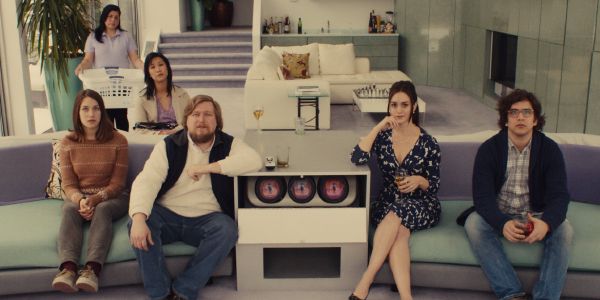Woody Allen’s Form & Legacy In Contemporary Cinema With CAFÉ SOCIETY

I'm a writer, artist and teacher based in Manchester, England.…
It now appears to be a given that every few years, Woody Allen produces a film hailed by critics as a “return to form”. In keeping with relatively recent late period offerings such as Blue Jasmine, Midnight in Paris and Vicky Cristina Barcelona, Café Society has also been afforded that accolade.
Is this lazy journalism or a concise way of communicating that he has again crafted a film that bears the hallmarks of this aging auteur’s better judgement? If the latter is true, then what defines that form? As Alvie might have said, self-consciously, on Annie Hall’s balcony: everything needs a set of aesthetic criteria, right?
Audience, setting and hallmarks
Allen used to make films which, for a brief moment in his career, had an urgent vitality: they mattered because they were contemporary and presented characters who were the epitome of the modern and sometimes controversially so. They were fascinating because they weren’t predictable; their lives were messy and the narrative did not allow for simple resolution.
Adults, particularly educated adults, professionals and artists could relate to the scenarios and the characters. The sensibility was that of the liberal intelligentsia who went to see Annie Hall and Manhattan and saw aspects of their own lives on screen. Arguably, the largest character in those films was the city itself, primarily New York City, romantic yet perilous, a synecdoche of the human condition, albeit specific to time and place.

Here, features of the metropolis were romanticised and suddenly galleries, art-house cinema queues, parks and riverside walks became the stuff of mythology; middle class melodrama maybe, but with a questing intelligence and penchant for asking existential questions that transcends the particularities of the setting.
West Coast East Coast conflicts
So what relates Café Society to classic Woody Allen? How does it return to form? Geography is a key weapon in Allen’s artillery. In recent films he has turned to Europe and been accused of using location to present chocolate box cinema of little significance.
However, in both Annie Hall and Café Society, the difference between New York City and Los Angeles represents deeper, psychological dichotomies that define the conflicts between and the struggles within the characters. The east coast is portrayed as realism, cynicism, compromise and acceptance whereas the west coast is dreams, idealism, stridency and dropping out of the workaday world. Woody Allen’s characters flip backwards and forwards, east coast, west coast, chasing their own shadows in finding out who they are and often literally, where they should be.
Serious comedy
It’s those same hallmarks I see in the work of Lena Dunham, Greta Gerwig and Noah Baumbach and Miranda July, as well as sophisticated offerings from Alex Ross Perry and Rebecca Miller. It seems to have taken a long time, but such films are having a new lease of life.
Whereas the humour in all those films may partly stem from self-effacement, from an unease or lack of confidence among Americans to take themselves as seriously as, say, Bergman or Kieslowski (regarded as the giants of European existentialist cinema), it’s a key component of the aesthetic criteria that defines this genre. In such cynical times, it’s the humour that gives the writers, directors, actors and the audience permission to indulge these problems for an hour or two and to revel in the comfort that we all wrestle with these demons.
Vital signs deteriorating?
At the start of this article I described Woody Allen’s films as once possessing an urgent vitality and as valuable, endearing and entertaining as they continue to be, they have not possessed that quality for a long time, and that’s no surprise. Despite the fact that his films are utterly idiosyncratic, identifiable from the opening credits, the font, the music and even the comportment of the protagonists, the majority of his characters are stock characters and the settings ready-made.

However, his production costs are relatively low, he works fast at roughly a film per year and despite accusations of quantity over quality, there is something defiantly admirable in his workmanlike ethos. Perhaps for him those tokenistic peripheral aspects of the film are to be treated as just that and so he urges us to afford them the scant consideration they deserve and suspend our disbelief. But not too much.
Allen‘s a New Yorker and he’s willing to compromise on such things, he knows it’s the kernels of truth that we’re after, the rest is just fluff and we can be expedient with that just as Ben and Veronica are with their relationships at the end of Café Society.
The legacy continues: Allen’s influence
In recent years, although Woody Allen’s films may have lacked that urgency and relevance, there is an increasing body of work, mostly articulated by female voices, pursuing the same themes of existential crises presented in darkly comedic hues. Rather than being derivative, such works are markedly original, maverick and hard to classify, yet they are united by protagonists who restlessly climb the walls of their urban situations self-consciously analysing their own lives just like Alvie Singer and Annie Hall.
The subtext moves to the fore in these works as key characters struggle with the conflict between their attempts to exert control over their wayward lives and their acceptance that so much of their lives are beyond their control. Whereas once such forces of influence were attributed to fate and the gods, in the human, urban arena of the 20th and 21st centuries, it’s jobs, debts, mortgages and relationships that threaten our sense of autonomy.

In Miranda July’s The Future, when the central couple struggle to find meaning in jobs and relationships that deny their true, authentic selves, they stop time itself to reclaim control over their lives. In Frances Ha and Mistress America, Baumbach casts Greta Gerwig as the central character riding the existentialist rollercoaster. In the former she plays a New Yorker living in bad faith, attempting to convince everyone and perhaps most importantly herself, that she really does have accommodation and a viable vocation as the member of a dance company. In the latter, the solution to the collapse of Brooke’s (Gerwig’s) money-making restaurant – her meal ticket to assuming the mantle in society she believes she deserves – is to ultimately move to Los Angeles, where she can dream again.
In both Maggie’s Plan and Listen Up Philip, the male characters’ pursuit of authenticity by becoming novelists is steeped in self-indulgence in contrast to the more subtle and poignant journeys of self-discovery on which Maggie (Gerwig) and Ashley (Moss) find themselves. And then, of course, there’s Lena Dunham’s debut, Tiny Furniture, in which the lure of artistic pursuits becomes entwined in the complex skein of family relations and the pressure to take jobs that actually pay – a theme revisited subsequently throughout each season of Girls.
Often dismissed and derided by critics as “quirky”, such films – comedic existentialism – intimately portray what it’s like to live in contemporary, middle class, educated societies and represent the need in their characters and through the films themselves, for a sophisticated yet contemporary, middle class, educated escape.
So what’s it to be, then? LA or NYC?
Does content like this matter to you?
Become a Member and support film journalism. Unlock access to all of Film Inquiry`s great articles. Join a community of like-minded readers who are passionate about cinema - get access to our private members Network, give back to independent filmmakers, and more.
I'm a writer, artist and teacher based in Manchester, England. My debut novel is entitled Look At What You Could Have Won and you can find extracts from it, along with my Anti-Reviews, original fiction written in response to art and cultural events, on my blog: This Is Not A Film Review.













